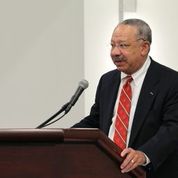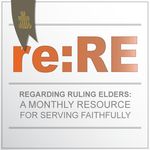People have various reasons, not always spiritual, for agreeing to serve as ruling elders, and I cannot say definitively that I said yes for the right reason. In fact, it may not have been a considered decision. With my training and experience as an Army officer, I usually make fast decisions. I was married three months after I met my wife, if we don't count the one-year gap in the relationship caused by a tour of duty in Vietnam.
If becoming a ruling elder was a snap decision for me, it has turned out to be one of the most important decisions of my life. My service as a ruling elder has repeatedly blessed me. For example, I have learned more about our historic principles and government than I would otherwise have learned. And  my decision-making has been informed by Presbyterian interpretation and use of Scripture. This is true of decisions I make in my professional life, in my family life, in my church work and in civic matters. For example, in deciding how to vote in political elections, I rely on Presbyterian interpretation and use of Scripture.
my decision-making has been informed by Presbyterian interpretation and use of Scripture. This is true of decisions I make in my professional life, in my family life, in my church work and in civic matters. For example, in deciding how to vote in political elections, I rely on Presbyterian interpretation and use of Scripture.
One of the ways I learned about what it means to be Presbyterian was to attend the then-monthly presbytery meetings, not always as a commissioner, usually as an observer. That may have contributed to my being placed on the reunion task force that was charged with combining six Alabama presbyteries into the present three. Service on that task force led to a turning point in my life as a ruling elder because soon after that, I was requested to serve as moderator of our presbytery. I initially told the Nominating Committee Moderator why it would be a mistake for me to serve as moderator of presbytery; my lame excuse was that I knew nothing about parliamentary procedure. That was true, but it was simply another way of saying that I was too lazy to spend an evening learning Robert's Rules.
information provided here:
Please contact Martha Miller at martha.miller@pcusa.org and browse the Ruling Elders Web site.
But my requestor persisted and prevailed, and my service as moderator of Presbytery brought home an important spiritual lesson: God does not call men and women to any task without equipping them for that task. Moses was one of many who have learned this lesson. You know he also made excuses about why he was not fit for the mission God assigned to him.
The text in Exodus makes God sound very casual. "So come, I will send you to Pharaoh to bring my people, the Israelites, out of Egypt." Moses, a lowly shepherd, understandably responded, "Who am I that I should go to Pharaoh, and bring the Israelites out of Egypt?" Even after God reassured Moses, "I will be with you . . . ." Moses still tried to back out, saying, "O my Lord, I have never been eloquent, neither in the past nor even now that you have spoken to your servant; but I am slow of speech and slow of tongue." "Then the Lord said to him, ‘Who gives speech to mortals? Who makes them mute or deaf, seeing or blind? Is it not I, the Lord? Now go, and I will be with your mouth and teach you what you are to speak." Still Moses demurred, begging the Lord to "please send someone else."
We know that God, acting through his agent Moses, accomplished the mission of bringing the Israelites out of Egypt. Similarly, God chose Gideon to command an army of just 300 to save Israel from its numerous enemies. Jonah tried to run from God, but God used him to save all the inhabitants of a great city from destruction. And with God's help, the Presbytery survived my term as its moderator, and I no longer had an excuse for declining God's call. I have since found it mostly impossible to say no when requested to serve in church leadership positions, even those that seem to require qualifications that I do not seem to possess. I have learned that if we say yes and take a small step towards the task, God equips us to finish the task. It really is true that "I can do all things through Christ who strengthens me."
Moreover, we should be comforted and inspired when we see God using us to do God’s work. That is evidence of our salvation, fruit of the spirit. It is evidence of our humility and dependence on Christ: I believe that is part of Paul's point in II Corinthians 12:9: "But [God] said to me, 'My grace is sufficient for you, for my power is made perfect in weakness.' Therefore I will boast all the more gladly about my weaknesses, so that Christ’s power may rest on me."

